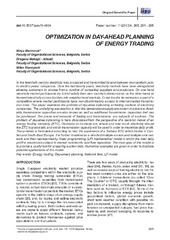Please use this identifier to cite or link to this item:
https://rfos.fon.bg.ac.rs/handle/123456789/1079Full metadata record
| DC Field | Value | Language |
|---|---|---|
| dc.creator | Marinović, Minja | |
| dc.creator | Makajić-Nikolić, Dragana | |
| dc.creator | Stanojević, Milan | |
| dc.date.accessioned | 2023-05-12T10:37:57Z | - |
| dc.date.available | 2023-05-12T10:37:57Z | - |
| dc.date.issued | 2013 | |
| dc.identifier.issn | 1451-4117 | |
| dc.identifier.uri | https://rfos.fon.bg.ac.rs/handle/123456789/1079 | - |
| dc.description.abstract | Tokom XX veka proizvodnja i prenos električne energije su sprovođeni isključivo preko monopolističkih javnih kompanija za proizvodnju električne energije. Poslednjih dvadeset godina tržište električne energije je postalo otvoreno što je omogućilo potrošačima da biraju svoje dobavljače i proizvođače. Svi učesnici u trgovini pokušavaju najpre da zadovolje potrebe za električnom energijom u svojoj zemlji kao i da snabdevaju električnom energijom okolna tržišta. Međudržavna trgovina i snabdevanje predstavlja deo takmičenja gde svi učesnici imaju nediskriminatorni pristup transmisionim kapacitetima. U ovom radu posmatramo problem dnevnog planiranja trgovine električnom energijom. Pretpostavlja se da su ponuda i potražnja unapred poznate. Poznati su raspoloživi transmisioni kapaciteti kao i dodatni kapaciteti koji se mogu dokupiti. Cene kupovine, prodaje i prenosa električne energije su predmet aukcija. Opisani problem se ovde posmatra iz ugla donosioca odluke kompanije koja se bavi trgovinom električne energije. Odluke koje on donosi su: gde i koliko električne energije treba kupiti i prodati, kao i koji će se transmisioni kapaciteti koristiti u cilju maksimizacije dnevnog profita. Problem je formulisan na osnovu iskustva jedne kompanije za trgovinu električne energije iz Srbije koja posluje na teritoriji centralne i jugoistočne Evrope i modeliran kao orijentisani graf sa više izvora i ušća, a potom predstavljen linearnim modelom u kom se maksimizira dnevni profit pri ograničenjima za tržište i kapacitet protoka. Glavni cilj ovog modela je da omogući koristan alat za pripremu ponude za aukcije. Numerički primeri su prikazani u cilju da ilustruju moguću primenu samog modela. | sr |
| dc.description.abstract | In the twentieth century electricity was produced and transmitted by and between monopolistic public electric power companies. Over the last twenty years, electricity markets have been deregulated allowing customers to choose from a number of competing suppliers and producers. On one hand electricity market participants try to first satisfy their own country’s demand and, on the other hand, to transmit electricity across borders into neighborhood markets. Cross-border transmission is part of a competition where market participants have non-discriminatory access to interconnected transmission lines. This paper examines the problem of day-ahead planning at trading sections of electricity companies. The underlying assumption is that the demand and supply are known in advance. Available transmission capacities are also known as well as additional transmission capacities that can be purchased. The prices and amounts of trading and transmission are subjects of auctions. The problem of day-ahead planning is here discussed from the perspective of a decision maker of an energy trading company (ETC). Decisions to be made are: where and how much electricity should the ETC buy and sell, and which transmission capacity will be used in order to maximize daily profit. The problem is formulated according to real-life experience of a Serbian ETC which trades in Central and South-East Europe. It is further modeled as a directed multiple-source and multiple-sink network and then represented by linear programming (LP) mathematical model in which the total daily profit is maximized subject to market constraints and flow capacities. The main goal of this model is to provide a useful tool for preparing auction bids. Numerical examples are given in order to illustrate possible applications of the model. | en |
| dc.publisher | Institut za istraživanja i projektovanja u privredi, Beograd | |
| dc.relation | info:eu-repo/grantAgreement/MESTD/Technological Development (TD or TR)/32013/RS// | |
| dc.relation | info:eu-repo/grantAgreement/MESTD/Technological Development (TD or TR)/35045/RS// | |
| dc.rights | openAccess | |
| dc.rights.uri | https://creativecommons.org/licenses/by/4.0/ | |
| dc.source | Journal of Applied Engineering Science | |
| dc.subject | trgovina električnom energijom | sr |
| dc.subject | protok na mrežama | sr |
| dc.subject | LP model | sr |
| dc.subject | dnevno planiranje | sr |
| dc.subject | network flow | en |
| dc.subject | LP model | en |
| dc.subject | energy trading | en |
| dc.subject | day-ahead planning | en |
| dc.title | Optimizacija dnevnog planiranja trgovine električnom energijom | sr |
| dc.title | Optimization in day-ahead planning of energy trading | en |
| dc.type | article | |
| dc.rights.license | BY | |
| dc.citation.epage | 208 | |
| dc.citation.issue | 4 | |
| dc.citation.other | 11(4): 201-208 | |
| dc.citation.rank | M51 | |
| dc.citation.spage | 201 | |
| dc.citation.volume | 11 | |
| dc.identifier.doi | 10.5937/jaes11-4604 | |
| dc.identifier.fulltext | http://prototype2.rcub.bg.ac.rs/bitstream/id/47/1075.pdf | |
| dc.identifier.rcub | conv_569 | |
| dc.identifier.scopus | 2-s2.0-84891891928 | |
| dc.type.version | publishedVersion | |
| item.cerifentitytype | Publications | - |
| item.fulltext | With Fulltext | - |
| item.grantfulltext | open | - |
| item.openairecristype | http://purl.org/coar/resource_type/c_18cf | - |
| item.openairetype | article | - |
| Appears in Collections: | Radovi istraživača / Researchers’ publications | |
SCOPUSTM
Citations
5
checked on Nov 17, 2025
Download(s)
2
checked on Dec 28, 2025
Google ScholarTM
Check
Altmetric
This item is licensed under a Creative Commons License


